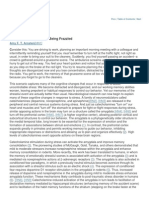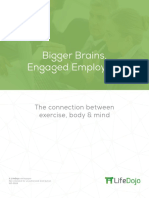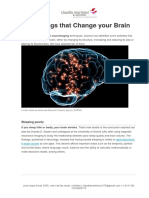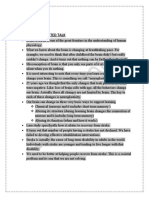0 ratings0% found this document useful (0 votes)
32 viewsNoggin Boosters: Brain Games
Noggin Boosters: Brain Games
Uploaded by
badaltripathi01nice
Copyright:
© All Rights Reserved
Available Formats
Download as DOCX, PDF, TXT or read online from Scribd
Noggin Boosters: Brain Games
Noggin Boosters: Brain Games
Uploaded by
badaltripathi010 ratings0% found this document useful (0 votes)
32 views5 pagesnice
Original Title
Brain Train
Copyright
© © All Rights Reserved
Available Formats
DOCX, PDF, TXT or read online from Scribd
Share this document
Did you find this document useful?
Is this content inappropriate?
nice
Copyright:
© All Rights Reserved
Available Formats
Download as DOCX, PDF, TXT or read online from Scribd
Download as docx, pdf, or txt
0 ratings0% found this document useful (0 votes)
32 views5 pagesNoggin Boosters: Brain Games
Noggin Boosters: Brain Games
Uploaded by
badaltripathi01nice
Copyright:
© All Rights Reserved
Available Formats
Download as DOCX, PDF, TXT or read online from Scribd
Download as docx, pdf, or txt
You are on page 1of 5
Sign InJoin
VIDEOSSCHEDULE
#BRAINGAMES EPISODE GUIDE
BRAIN GAMES MEET THE BRAIN
1k
By Patrick J. Kiger
NOGGIN BOOSTERS
3 Tips to Boost Your Brain's Connectivity and Elasticity
In this episode of Brain Games, we learn that, like the historic city of London,
our brain is a mix of older parts that perform important basic functions, such
as regulating breathing and creating a startle response to protect you from
danger, to newer parts that handle complex duties, such as processing
sensory information and understanding human language. The various parts
of your brain work together because of connectivitythat is, their ability to
communicate with one another and pool their efforts to perform challenging
tasks. Another key attribute is plasticity, the ability of your brain to rewire
itself to perform new tasks or change the way that it does something. Some
experts say it's possible to boost both connectivity and plasticity and get
more out of your brain. Here are some tips.
Break a sweat: A 2014 Australian study, reported in Medical News Daily,
found that a 30-minute session of vigorous exercise improved brain
plasticity, and lead to improvement in both memory and motor skill
coordination. Another study by researchers at the University of Illinois at
Urbana-Champaign found that exercise also boosted the thickness and
density of white matter, the material that connects different regions in
the brain. That, in turn, might give you a greater memory capacity,
attention span, and more cognitive efficiency.
Take up music: In a study presented at the Neuroscience 2013
conference in San Diego, Harvard University neuroscientist Dr. Gottfried
Schlaug and colleagues reported that practicing a musical instrument
strengthened communication between brain areas, as well as increased
the volume of the musician's brain.
Reduce your stress level: Not all connectivity, as it turns out, is good. As
reported inPsychology Today, University of California, Berkeley
neuroscientists have found that chronic stress triggers long-term changes
that can cause your brain to decline. Part of this is actually a bad sort of
connectivity, because the stress hormone cortisol helps to hardwire
pathways between the hippocampus and the amygdala that enable you
to stay in a chronically stressed-out state of flight-or-flight. At the same
time, stress also interferes with the ability of the prefrontal cortex to form
connections that would improve learning and memory, while hard-wiring
it to be predisposed to anxiety, depression and post-traumatic stress
disorder. So do your brain a favor by learning some relaxation techniques
such as meditation and breathing exercises, which are proven tools for
managing stress.
0 COMMENTS
Sign in
31 PEOPLE LISTENING
+ Follow
Share
Post comment as...
NEWEST | OLDEST | TOP COMMENTS
RELATED
PHOTOS
SPIRITUAL SERENDIPITY
For some, signs of spirituality can be found just about everywhere. Can you see the
faces in these scenes of nature?
ARTICLE
3 LIFE TIPS THAT CROSS MULTIPLE
Here are some simple yet effective ways to live up to the "Golden Rule."
ARTICLE
YOUR BRAIN ON GOD
Take a deeper look at the neuroscience behind believing in the divine.
ARTICLE
YOUR BRAIN IS A CITY
What does your brain and the city of London have in common? More than you think.
Abo
ut Contact Gifts Customer Service Advertise With Us Terms of Service Privacy Policy
1996-2016 National Geographic Channel. All rights reserved.
You might also like
- Boost Your Brain Health - A Practical Guide To Keep Your Brain Sharp And Improve Memory Power As You AgeFrom EverandBoost Your Brain Health - A Practical Guide To Keep Your Brain Sharp And Improve Memory Power As You AgeRating: 3.5 out of 5 stars3.5/5 (9)
- BDS Curriculum (1st Year - Final Year) RGUHSDocument177 pagesBDS Curriculum (1st Year - Final Year) RGUHSdocakshay9288% (8)
- The Biology of Being Frazzled (Arnsthen A., 1998)Document3 pagesThe Biology of Being Frazzled (Arnsthen A., 1998)JuanCarlosEspecializaciónNo ratings yet
- Science5 q2 Mod2 Menstrual-Cycle v4Document14 pagesScience5 q2 Mod2 Menstrual-Cycle v4pot pooot86% (21)
- Meditation GuideDocument50 pagesMeditation GuideSimona Goldstein100% (3)
- What Is Neuroplasticity A Psychologist Explains 14 ExercisesDocument18 pagesWhat Is Neuroplasticity A Psychologist Explains 14 Exercisesn0rbertt100% (1)
- Neurolymphatic Points Chapmans ReflexesDocument15 pagesNeurolymphatic Points Chapmans Reflexestaichi7100% (15)
- Secretory Functions of GITDocument24 pagesSecretory Functions of GITDr.Nusrat TariqNo ratings yet
- Clear Blocked EnergyDocument1 pageClear Blocked EnergyUniversal Healing Tao93% (15)
- Neurogenesis: The Amygdala and The HippocampusDocument3 pagesNeurogenesis: The Amygdala and The HippocampusAnonymous j3gtTw100% (1)
- The Benefit of Practicing Mindfulness To The BrainDocument5 pagesThe Benefit of Practicing Mindfulness To The BrainLê Trung TínNo ratings yet
- How To Boost Brain PowerDocument9 pagesHow To Boost Brain PowerNabin Raj KcNo ratings yet
- Finals Power Point Learning To Be A Better StudentDocument21 pagesFinals Power Point Learning To Be A Better StudentmarcosjessleebNo ratings yet
- What Happens To The Brain As We AgeDocument11 pagesWhat Happens To The Brain As We AgeMrigank Aggarwal100% (1)
- Exercise and Your Brain-How-To Boost Employee ProductivityDocument10 pagesExercise and Your Brain-How-To Boost Employee ProductivityfabydocNo ratings yet
- Your Brain On ExerciseDocument10 pagesYour Brain On ExerciseMay May100% (5)
- Brain Overhaul: Upgrading Your Mind for Accelerated Learning and SuccessFrom EverandBrain Overhaul: Upgrading Your Mind for Accelerated Learning and SuccessNo ratings yet
- 5 Surprising Ways That Stress Affects Your Brain: More in TheoriesDocument5 pages5 Surprising Ways That Stress Affects Your Brain: More in TheoriesMuhdAisar96No ratings yet
- 10 Things That Change Your BrainDocument7 pages10 Things That Change Your BrainraviliaNo ratings yet
- maintain-optimal-cognitive-function-pdfDocument11 pagesmaintain-optimal-cognitive-function-pdfGabriel Antonio NájeraNo ratings yet
- Interesting Ways To Boost Your BrainDocument3 pagesInteresting Ways To Boost Your Brainzahirul007No ratings yet
- The Brain Boost Blueprint: How To Optimize Your Brain for Peak Mental Performance, Neurogrowth, and Cognitive FitnessFrom EverandThe Brain Boost Blueprint: How To Optimize Your Brain for Peak Mental Performance, Neurogrowth, and Cognitive FitnessRating: 4 out of 5 stars4/5 (1)
- Excerpt From Spark - The Revolutionary Science of Exercise and The Brain LoyolaDocument5 pagesExcerpt From Spark - The Revolutionary Science of Exercise and The Brain LoyolaValerio Ernesto CòlibroNo ratings yet
- Healthy Aging: Optimizing Your Brain HealthDocument38 pagesHealthy Aging: Optimizing Your Brain Healthwoody0No ratings yet
- 1.-FINALS-MANAGING-AND-CARING-FOR-THE-SELFDocument30 pages1.-FINALS-MANAGING-AND-CARING-FOR-THE-SELFbtchonmydeckNo ratings yet
- Brain Rules v1Document6 pagesBrain Rules v1jeffNo ratings yet
- Spinal Cord StoryDocument7 pagesSpinal Cord StoryDishaNo ratings yet
- Tips To Improve MemoryDocument4 pagesTips To Improve Memoryoscar gmNo ratings yet
- 16-30 Phy Psy Unit 2Document15 pages16-30 Phy Psy Unit 2A SnehaNo ratings yet
- The Brain Mechanic: How to Optimize Your Brain for Peak Mental Performance, Neurogrowth, and Cognitive FitnessFrom EverandThe Brain Mechanic: How to Optimize Your Brain for Peak Mental Performance, Neurogrowth, and Cognitive FitnessNo ratings yet
- Effect of Swimming Programm On Dementie A Mong Elderly Women in Kuwait Kifaa Karalla Mishary PH.DDocument13 pagesEffect of Swimming Programm On Dementie A Mong Elderly Women in Kuwait Kifaa Karalla Mishary PH.DAhmed YaseinNo ratings yet
- Meditation's Calming Effects Pinpointed in Brain - Scientific AmericanDocument10 pagesMeditation's Calming Effects Pinpointed in Brain - Scientific AmericanmatteiotoneNo ratings yet
- Trends Lesson 5Document6 pagesTrends Lesson 5John Rey AmpoonNo ratings yet
- Exercise Benefits Brain ArticleDocument4 pagesExercise Benefits Brain Articleapi-310709379No ratings yet
- LP6 PerdevDocument6 pagesLP6 PerdevChristine Marie A Llanera-CadalloNo ratings yet
- Extended Essay Draft 1Document17 pagesExtended Essay Draft 1f8vc8zb9whNo ratings yet
- Sharpen Your Brain To Improve Performance Lower StressDocument3 pagesSharpen Your Brain To Improve Performance Lower StressEnglish TeachingNo ratings yet
- Classical ConditioningDocument4 pagesClassical ConditioningPriyanshi PrajapatiNo ratings yet
- Plasticity and Functional Recovery of The BrainDocument3 pagesPlasticity and Functional Recovery of The Brainarunima2001No ratings yet
- TRENDS - Week 5 and 6 ModuleDocument5 pagesTRENDS - Week 5 and 6 ModuleCaroline de TazaNo ratings yet
- Proven Ways To Increase Intelligence - Kundalini-MeditationDocument7 pagesProven Ways To Increase Intelligence - Kundalini-MeditationTheresa BaezNo ratings yet
- NEW TEDtalkDocument2 pagesNEW TEDtalkSara Riaz SharifNo ratings yet
- Brain HealthDocument11 pagesBrain HealthRonie ApellidoNo ratings yet
- Brain Plasticity - How Experience Changes The BrainDocument5 pagesBrain Plasticity - How Experience Changes The BrainWilson OTONo ratings yet
- Mindfulness Book - Chapter 2Document6 pagesMindfulness Book - Chapter 2clararobertsoteroNo ratings yet
- The Yogi Masters Were RightDocument2 pagesThe Yogi Masters Were RightAušra ApalianskytėNo ratings yet
- Brain PlasticityDocument7 pagesBrain Plasticityfederson2760No ratings yet
- Research Paper On Sleep StagesDocument7 pagesResearch Paper On Sleep Stagesnbaamubnd100% (1)
- Deu Branco - Everyday Stress Can Shut Down The Brain's Chief Command Center - Scientific AmericanDocument14 pagesDeu Branco - Everyday Stress Can Shut Down The Brain's Chief Command Center - Scientific AmericanDanielNo ratings yet
- The Effect of Super Brain Yoga in Cognitive Processing of Selected University StudentsDocument10 pagesThe Effect of Super Brain Yoga in Cognitive Processing of Selected University StudentsJoe Eric CorreNo ratings yet
- Memory Human BrainDocument40 pagesMemory Human Brainismannaba7No ratings yet
- (English) After Watching This, Your Brain Will Not Be The Same - Lara Boyd - TEDxVancouver (DownSub - Com)Document12 pages(English) After Watching This, Your Brain Will Not Be The Same - Lara Boyd - TEDxVancouver (DownSub - Com)Maulana Yazid Al AnnuriNo ratings yet
- The Effect of Super Brain Yoga in Cognitive Processing of Selected University StudentsDocument10 pagesThe Effect of Super Brain Yoga in Cognitive Processing of Selected University StudentsJoe Eric CorreNo ratings yet
- Dissertation Mirror NeuronsDocument5 pagesDissertation Mirror NeuronsBuyingPapersUK100% (1)
- SRP Bibliography AnnotationsDocument3 pagesSRP Bibliography AnnotationsSkylar Anthony Lewis DerthickNo ratings yet
- Neuroplasticity Uncovered - How to Rewire Your Brain for SuccessFrom EverandNeuroplasticity Uncovered - How to Rewire Your Brain for SuccessNo ratings yet
- Brain and Behavior Research Paper TopicsDocument7 pagesBrain and Behavior Research Paper Topicsyquyxsund100% (1)
- Exercises for the Brain and Memory : 70 Neurobic Exercises & FUN Puzzles to Increase Mental Fitness & Boost Your Brain Juice Today: (Special 2 In 1 Exclusive Edition)From EverandExercises for the Brain and Memory : 70 Neurobic Exercises & FUN Puzzles to Increase Mental Fitness & Boost Your Brain Juice Today: (Special 2 In 1 Exclusive Edition)Rating: 4 out of 5 stars4/5 (1)
- Why One Neuroscientist Started Blasting His CoreDocument4 pagesWhy One Neuroscientist Started Blasting His CoreVinceNo ratings yet
- Lesson 4 PDFDocument2 pagesLesson 4 PDFsumiyaNo ratings yet
- NeuroplasticityDocument1 pageNeuroplasticityAlfonso Legaspi ViñegasNo ratings yet
- DR - Shaheen KashifDocument130 pagesDR - Shaheen KashifAbdul Subur100% (2)
- Format Pengkajian Bahasa InggrisDocument3 pagesFormat Pengkajian Bahasa InggrisSapnahNo ratings yet
- Sexual Reproduction in Human Beings (Part 1)Document40 pagesSexual Reproduction in Human Beings (Part 1)puspita8967628100% (1)
- Lecture Medskull - ModofiedDocument88 pagesLecture Medskull - ModofiedNikolai SamaniegoNo ratings yet
- Reproductive Systems A. B. C. DDocument6 pagesReproductive Systems A. B. C. DJamie BagundolNo ratings yet
- Scott 5Document520 pagesScott 5Ayu WulandariNo ratings yet
- Seminal VesicleDocument6 pagesSeminal VesicleRonNo ratings yet
- Type of Edema and Its MechanismDocument7 pagesType of Edema and Its MechanismLenovo Legion Y520No ratings yet
- Pathology of Hemodynamic Disorders 1 and 2 Practice Questions-1Document26 pagesPathology of Hemodynamic Disorders 1 and 2 Practice Questions-1JCNo ratings yet
- Posterior Pituitary HormonesDocument15 pagesPosterior Pituitary Hormonesapi-19916399No ratings yet
- Final Biology Project FileDocument28 pagesFinal Biology Project FileSonai KeshNo ratings yet
- Blood Component Therapy F17Document33 pagesBlood Component Therapy F17Crystal LynaeNo ratings yet
- Figure 8.1 Red Deer Molar Showing Cuspal Wear: Type and Degree of Wear Loc. Score Spec. NoDocument1 pageFigure 8.1 Red Deer Molar Showing Cuspal Wear: Type and Degree of Wear Loc. Score Spec. NoAadelNo ratings yet
- NO Identitas Pasien Bangsal Diagnosis Diagnosis Sekunder Rencana Operator Kamar OK Asisten AlatDocument2 pagesNO Identitas Pasien Bangsal Diagnosis Diagnosis Sekunder Rencana Operator Kamar OK Asisten AlatLink BudhiNo ratings yet
- Small IntestineDocument34 pagesSmall IntestineIAMSANWAR019170100% (1)
- The Transition From Standard Edgewise To Preadjusted ApplianceDocument6 pagesThe Transition From Standard Edgewise To Preadjusted ApplianceWayan ArdhanaNo ratings yet
- Digestive SystemDocument58 pagesDigestive SystemseibdNo ratings yet
- SchizophreniaDocument51 pagesSchizophreniaGino Al Ballano BorinagaNo ratings yet
- Activity 4 PEX-02-04 PDFDocument7 pagesActivity 4 PEX-02-04 PDFSarah Shafa Marwadhani0% (1)
- Rhythmical Excitation of The HeartDocument6 pagesRhythmical Excitation of The HeartTONY GO AWAYNo ratings yet
- Complete Dentures: Arthur RussellDocument11 pagesComplete Dentures: Arthur RussellGermán PuigNo ratings yet
- Chapter 17: Review QuestionsDocument4 pagesChapter 17: Review Questionsemms meNo ratings yet
- The Cardiovascular SystemDocument29 pagesThe Cardiovascular SystemTumbali Kein Chester BayleNo ratings yet
- Physical Assessment FormatDocument4 pagesPhysical Assessment Formatanreilegarde67% (3)
- Analisis Faktor-Faktor Yang Berhubungan Tekanan Darah Sistole Pada Peserta Pelatihan Manajemen PuskesmasDocument17 pagesAnalisis Faktor-Faktor Yang Berhubungan Tekanan Darah Sistole Pada Peserta Pelatihan Manajemen PuskesmasApolonia BethanNo ratings yet

























































































